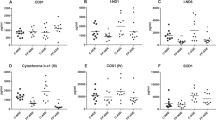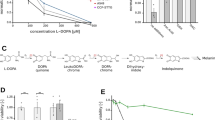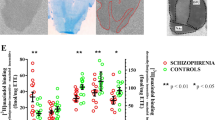Abstract
The effects of the neuroleptic flupenthixol on the expression of the genes coding for the mitochondrial ubiquinone and cytochrome b5 reductases have been studied because of the importance of these enzymes in energy metabolism, oxidative stress and also because similar but oppositely directed changes have been previously observed in the cerebral cortex from schizophrenics. The neuroleptic flupenthixol reduces the expression in rats of the gene coding for NADH-cytochrome b5 reductase as measured by in situ hybridisation and its enzymic manifestation. Flupenthixol also reduces the enzymic activity of the mitochondrial NADH-ubiquinone reductase, and it has been previously shown that mRNA from the mitochondrially coded parts of the enzyme are reduced by the drug. Both the cis- and therapeutically less active trans-flupenthixol were found to produce these changes in rats. Post-mortem brain tissue from schizophrenics who have received neuroleptic medication have reduced levels of both reductases as measured enzymically, Lymphocyte samples from schizophrenics also have reduced levels of both reductases compared with normals. The superoxide anion O2- is the principle agent of oxidative stress and both the cytochrome b5 and the ubiquinone reductase enzymes were semi-purified from sheep liver and shown to produce appreciable amounts of superoxide. Superoxide production is reduced in brain homogenates from rats treated with flupenthixol. Its production is also reduced in brain tissue and lymphocytes from schizophrenics receiving neuroleptic medication. We conclude that neuroleptic medication reduces the expression of both the ubiquinone and cytochrome b5 reductase and among the effects of this reduction is a decrease in the production of neurotoxic superoxide.
This is a preview of subscription content, access via your institution
Access options
Subscribe to this journal
Receive 12 print issues and online access
$259.00 per year
only $21.58 per issue
Buy this article
- Purchase on Springer Link
- Instant access to full article PDF
Prices may be subject to local taxes which are calculated during checkout
Similar content being viewed by others
Author information
Authors and Affiliations
Rights and permissions
About this article
Cite this article
Whatley, S., Curti, D., Gupta, F. et al. Superoxide, neuroleptics and the ubiquinone and cytochrome b5 reductases in brain and lymphocytes from normals and schizophrenic patients. Mol Psychiatry 3, 227–237 (1998). https://doi.org/10.1038/sj.mp.4000375
Received:
Revised:
Accepted:
Published:
Issue Date:
DOI: https://doi.org/10.1038/sj.mp.4000375
Keywords
This article is cited by
-
Mitochondria DNA copy number, mitochondria DNA total somatic deletions, Complex I activity, synapse number, and synaptic mitochondria number are altered in schizophrenia and bipolar disorder
Translational Psychiatry (2022)
-
Recent Reports on Redox Stress-Induced Mitochondrial DNA Variations, Neuroglial Interactions, and NMDA Receptor System in Pathophysiology of Schizophrenia
Molecular Neurobiology (2022)
-
Microsomal reductase activity in patients with thyroid neoplasms
Endocrine (2021)
-
Mitochondrial function in individuals at clinical high risk for psychosis
Scientific Reports (2018)
-
Dopamine perturbation of gene co-expression networks reveals differential response in schizophrenia for translational machinery
Translational Psychiatry (2018)



